 Petzlover
Petzlover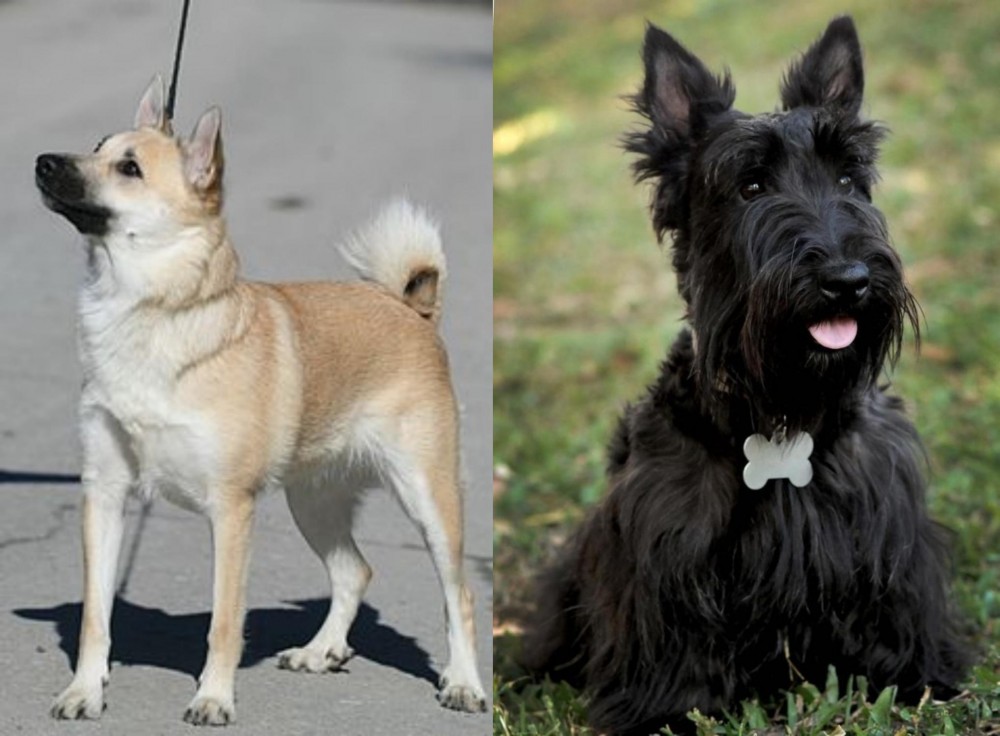 Norwegian Buhund is originated from Norway but Scoland Terrier is originated from United Kingdom. Norwegian Buhund may grow 20 cm / 8 inches higher than Scoland Terrier. Norwegian Buhund may weigh 8 kg / 18 pounds more than Scoland Terrier. Both Norwegian Buhund and Scoland Terrier has almost same life span. Norwegian Buhund may have less litter size than Scoland Terrier. Norwegian Buhund requires Moderate Maintenance. But Scoland Terrier requires High Maintenance
Norwegian Buhund is originated from Norway but Scoland Terrier is originated from United Kingdom. Norwegian Buhund may grow 20 cm / 8 inches higher than Scoland Terrier. Norwegian Buhund may weigh 8 kg / 18 pounds more than Scoland Terrier. Both Norwegian Buhund and Scoland Terrier has almost same life span. Norwegian Buhund may have less litter size than Scoland Terrier. Norwegian Buhund requires Moderate Maintenance. But Scoland Terrier requires High Maintenance
 The Norwegian Buhund is a spitz type dog belonging to the herding group of dogs. The dog is related to the Icelandic Sheepdog and the Jämthund.
The Norwegian Buhund is a spitz type dog belonging to the herding group of dogs. The dog is related to the Icelandic Sheepdog and the Jämthund.
This dog breed dates back thousands of years to Nordic Viking times. For centuries these dogs have served working dogs, being herders as well as guardians of flock. Even today in remote parts of Norway, you’ll still find this dog doing farm work.
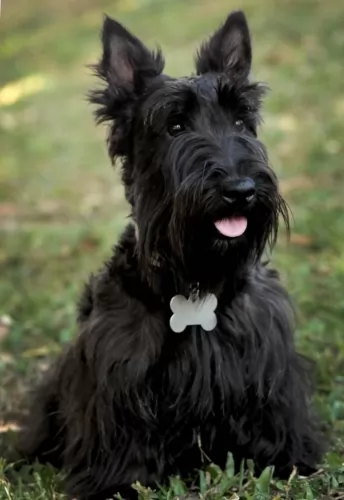 Not much is known about the Scoland Terrier. It is not a purebred but rather a crossbreed developed by crossing the Scottish Terrier with the Westland Terrier. To understand these mixed breeds, look to the original breeds for any combination of the characteristics of the breeds. The offspring of this crossing is not a 50-50 split of the original breeds looks or temperament.
Not much is known about the Scoland Terrier. It is not a purebred but rather a crossbreed developed by crossing the Scottish Terrier with the Westland Terrier. To understand these mixed breeds, look to the original breeds for any combination of the characteristics of the breeds. The offspring of this crossing is not a 50-50 split of the original breeds looks or temperament.
Because the Scoland Terrier is a mix between the Scottie and the Westie he has all the characteristics of a typical terrier perhaps even twice as much. With both parents being terriers, you can expect your Scoland to act like a short legged terrier. These dogs are known for their courage and tenacity. Today these terriers are family companions. Most terriers today come from a pool of ancestral dog in the 19th century in Europe. This information was gleaned from a genetic analysis done in 2006.
The Scoland Terrier, being a hybrid, is not acknowledged by the American Kennel Club (AKC) or the United Kennel Club (UKC). It is acknowledged by the International Designer Canine Registry (IDCR), American Canine Hybrid Club (ACHC), Dog Registry of America, Inc. (DRA), Designer Dogs Kennel Club (DDKC) and Designer Breed Registry (DBR).
 The Norwegian Buhund stands at 41 to 47cm in height both male and female. He is a medium sized dog and weighs between 12 and 18kg.
The Norwegian Buhund stands at 41 to 47cm in height both male and female. He is a medium sized dog and weighs between 12 and 18kg.
Known as a herding dog, he is described as being deep chested with a well built, compact body, erect ears and a tail which curves over the back. The head of the dog is wedge-shaped and he has a bright, intelligent look to him.
The coat is essentially a wheaten color but it can be other shades such as a pale cream color to bright orange and sometimes even black. The coat is short to medium in length and he sheds moderately with some seasonal shedding as well.
Fun loving, friendly and social, the Norwegian Buhund is also an active dog who will always be pleading with you for a game or walkies. His pleading brown eyes will hopefully soften your heart towards him so that you give him a ball game or a run in the park. It is why this dog breed gets on well with children – he loves to be playing games with them.
They are such lovable dogs, wanting to spend time with their human family and always ready with a doggy kiss. They want to protect the ones they love and this makes them good watchdogs too, being wary around strangers. He is highly intelligent and will go through training and socialization with ease.
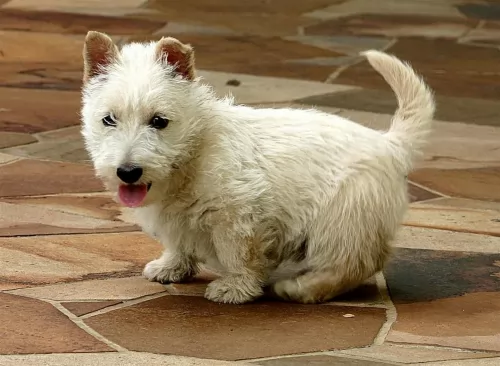 Being a hybrid, the Scoland Terrier will not always look alike and could look like a Scottie, a Westie or a combination of the two. Most breeders of this designer dog say it usually has a body like the Scottie and a round head like the Westie. They are more often black with white markings, but they can often be wheaten as well. With round dark eyes, a scissors bite and black nose, her face is unique. The breed has erect and small, triangular ears and a medium fluffy tale. The coat is hard and wiry, with a dense soft undercoat.
Being a hybrid, the Scoland Terrier will not always look alike and could look like a Scottie, a Westie or a combination of the two. Most breeders of this designer dog say it usually has a body like the Scottie and a round head like the Westie. They are more often black with white markings, but they can often be wheaten as well. With round dark eyes, a scissors bite and black nose, her face is unique. The breed has erect and small, triangular ears and a medium fluffy tale. The coat is hard and wiry, with a dense soft undercoat.
 He will need exercise on a daily basis. They are lovable dogs and are affectionate towards children in the home. They form strong bonds with their human family.
He will need exercise on a daily basis. They are lovable dogs and are affectionate towards children in the home. They form strong bonds with their human family.
He is a strong willed dog, and will require training and socialization. As a working and herding dog, he wants to be busy, and is perhaps best suited to life in the suburbs or countryside as opposed to living in the city.
He makes an awesome companion dog and he wants to please his human family and be an active part of their lives.
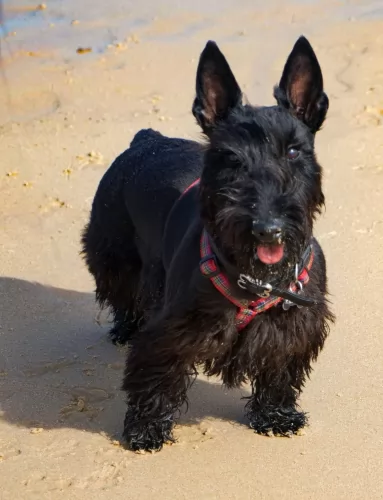 1.Children friendliness - they can be very good with children and children can help them get their exercise.
1.Children friendliness - they can be very good with children and children can help them get their exercise.
3.Adaptability - yes but she is adept at digging and must have a safe enclosure.
 Provide your Norwegian Buhund with the right care and he can get to 15 years of age. Hip dysplasia is always an issue with dogs and you should be very wary of it as it can cause lameness and pain.
Provide your Norwegian Buhund with the right care and he can get to 15 years of age. Hip dysplasia is always an issue with dogs and you should be very wary of it as it can cause lameness and pain.
Cataracts is another illness that you want to be aware of. Although not painful, this eye aliment can lead to blindness.
Look out for other common dog illnesses such as bloat, skin allergies and cancer.
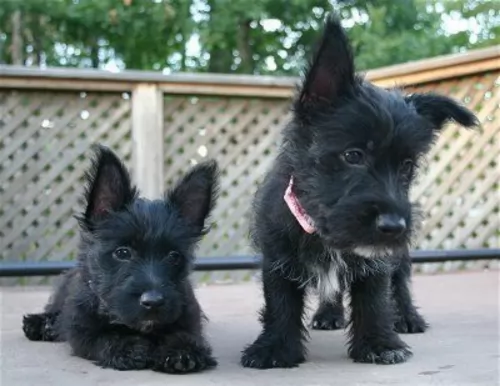 This hybrid dog can inherit any of the issues faced by its two parent breeds. For the Scoland Terrier this can include:
This hybrid dog can inherit any of the issues faced by its two parent breeds. For the Scoland Terrier this can include:
• Seborrhea – Skin disease that can cause dogs to scratch until bleeding and/or infected.
• Carniomandibular Osteopathy -called lion’s jaw this is a developmental disease that causes extensive changes in the bones of the mandible and skull.
• Pulmonic Stenosis – when the blood flowing from the heart’s right ventricul to the pulmonary artery is blocked.
• PPM or Persistent Pupillary Membranes - causes visual impairment when the membranes do not dissolve after birth.
• Chronic Hepatitis – disease of the liver that can eventually cause major damage.
 You’re going to need to provide this dog of yours with activities that stimulate him physically and mentally. The Norwegian Buhund isn’t a couch-potato type of dog and he doesn’t do well with just lying around. Take him on walks and hikes, throw balls or frisbees for him and buy him some toys that can entertain him. You want to avoid him barking and digging from sheer boredom.
You’re going to need to provide this dog of yours with activities that stimulate him physically and mentally. The Norwegian Buhund isn’t a couch-potato type of dog and he doesn’t do well with just lying around. Take him on walks and hikes, throw balls or frisbees for him and buy him some toys that can entertain him. You want to avoid him barking and digging from sheer boredom.
Like all other spitz-breed dogs, the Norwegian Buhund has a thick double coat, and because he sheds moderately, you will need to brush him at least twice a week. Check simultaneously for ticks and fleas.
Check your pets eye and ears for infection and check his teeth. A rotting tooth at the back of his mouth can be the cause of a lot of pain and problems throughout the body. Keep his nails clipped as well so as to prevent them hooking onto things.
Provide your pet with a nice warm, dry, comfortable place to sleep. If he goes outside, make sure he has a place to lie in the shade or in the sun.
Take your pet to the vet when he appears to be lethargic and sick. Remember to keep his vaccines up to date.
Feed your pet food which is known for its nutritional value. Home made food is a real treat for your pet, but high quality commercially manufactured food can be good and convenient too.
Dogs love simple, consistent diets which don’t upset their stomachs. Boiled chicken, brown rice or pasta, and some vegetables such as sweet potatoes, spinach and carrots chopped up into his food from time to time can be superbly nutritious for your pet. Try and also include a little bit of raw meat occasionally. Always have a bowl of fresh, cool water available to your pet.
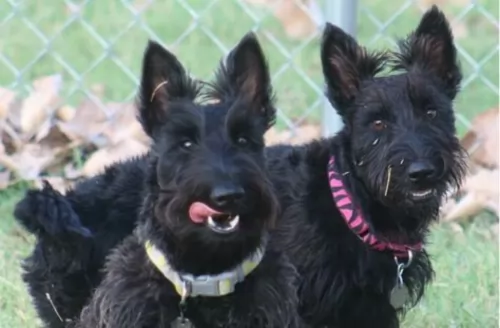 1.Feeding the puppy - Give a high quality puppy dog food designed for terriers or active medium sized dogs. Give ¾ of a cup over 3 meals a day.
1.Feeding the puppy - Give a high quality puppy dog food designed for terriers or active medium sized dogs. Give ¾ of a cup over 3 meals a day.
2.Feeding the adult – Give a high quality adult dog food designed for terriers or active medium sized dogs. Give one cup over two meals a day.
4. Games and Exercises – The Scoland Terrier is a very active dog and needs daily exercise, He need time to play, run, and be stimulated by games. She would be very good at flyball, Frisbee, fetch, agility, barn hunt, and obedience. He needs at least 2 hours of play and exercise everyday.